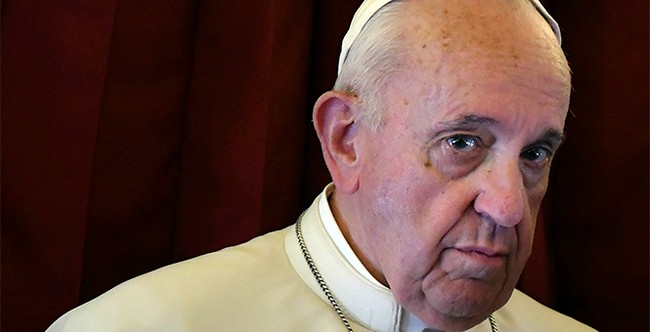
The Bishop of Rome and earthly head of the Roman Catholic Church, Pope Francis, has passed away. He was 88, and has died after a lengthy, lingering illness.
He was the first Jesuit pope and the first pope to have been born in South America (he was born into an Italian family in Argentina). As the Jesuit order and the Roman Catholic Church in South America both tend to lean to the left, so also did the twelve years of his papacy.
Pope Francis’ papacy was full of controversy, much of it which he himself sparked with a comment that the Vatican then explained was his own personal opinion, and not the position of the Church. The Catholic Herald reported in Sept. 2024 that Pope Francis had declared that “all religions are a path to God.” He explained: “They are like different languages in order to arrive at God, but God is God for all. Since God is God for all, then we are all children of God. If you start to fight, ‘my religion is more important than yours, mine is true and yours isn’t’, where will that lead us? There’s only one God, and each of us has a language to arrive at God. Some are [Sikh], Muslim, Hindu, Christian, and they are different paths [to God].”
Francis was apparently contradicting both Jesus’ statement: “I am the way, and the truth, and the life; no one comes to the Father but by me” (John 14:6), as well the teaching of the Roman Catholic Church’s Second Vatican Council, which emphasized that it was “the burden of the Church’s preaching to proclaim the cross of Christ as the sign of God’s all-embracing love and as the fountain from which every grace flows.” (Nostra Aetate 2, 4) The Catholic Herald noted that in making these remarks, the pope had set aside his prepared remarks and was speaking extemporaneously.
Even his official papal statements, however, also included a great deal of material that led people to wonder if the age-old question that was supposed to imply that the answer was obvious, “Is the Pope Catholic?,” actually now admitted of a negative response.
Argentine President Javier Milei derided him as a “Communist” and even as “the representative of the evil one on earth.” In 2023, Pope Francis responded to a series of dubia (“doubts”) that Cardinals Walter Brandmüller and Raymond Leo Burke, along with the support of three other Cardinals, Juan Sandoval Íñiguez, Robert Sarah, and Joseph Zen Ze-kiun, had sent him the previous year, asking him to clarify his position on five issues where he had appeared to depart from the actual teaching of the Roman Catholic Church; Vatican News identified these as “the interpretation of Divine Revelation, the blessing of same-sex unions, synodality as a constitutive dimension of the Church, the priestly ordination of women, and repentance as a necessary condition for sacramental absolution.”
The most striking aspect of this incident was neither the questions nor the pope’s answers, but the fact that it had happened at all, that it had been necessary to question the guardian and anchor of the Roman Catholic faith over his own adherence to that faith. There was no parallel to this in modern times, and it exemplified how much Francis was very different kind of pope from the great majority of his predecessors.
Related: During Holy Week, the World Council of Churches Promotes Christianity — Nah, Just Kidding…
Francis also followed a leftist line on most of the burning political issues of our day. In 2016, he declared that someone who built a border wall was “not a Christian.” In Feb. 2025, he sent a letter to the U.S. bishops, excoriating Trump for securing America’s southern border. He repeatedly insisted that welcoming any and all migrants was a Christian duty, and rejected “any measure that tacitly or explicitly identifies the illegal status of some migrants with criminality.”
The pope worked hard also to build bridges with the international Islamic community, downplaying Islamic jihad terrorism, ignoring the rampant Muslim persecution of Christians in the Middle East and Africa, and even obliquely justifying the 2015 murders of cartoonists of the French satirical magazine Charlie Hebdo who had lampooned the Islamic prophet Muhammad. Francis said that “it is true that you must not react violently, but although we are good friends, if [an aide] says a curse word against my mother, he can expect a punch, it’s normal. You can’t make a toy out of the religions of others. These people provoke and then (something can happen). In freedom of expression, there are limits.” This was, in essence, a submission to Islam’s blasphemy laws which would, if followed, mean the end of free societies.
What will the Roman Catholic Church do now? Will it continue to follow in the way of Pope Francis, or will it heed the call of millions to return to a more traditional approach to the faith? The world watches and waits.
At PJ Media, we bring you all the news, without fear or favor. Become a PJ Media VIP member. Get all our articles, all our podcasts, and none of the ads. Get a massive 60% off if you use the promo code FIGHT!















